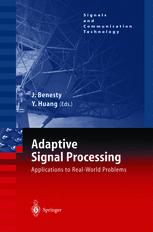

Most ebook files are in PDF format, so you can easily read them using various software such as Foxit Reader or directly on the Google Chrome browser.
Some ebook files are released by publishers in other formats such as .awz, .mobi, .epub, .fb2, etc. You may need to install specific software to read these formats on mobile/PC, such as Calibre.
Please read the tutorial at this link: https://ebookbell.com/faq
We offer FREE conversion to the popular formats you request; however, this may take some time. Therefore, right after payment, please email us, and we will try to provide the service as quickly as possible.
For some exceptional file formats or broken links (if any), please refrain from opening any disputes. Instead, email us first, and we will try to assist within a maximum of 6 hours.
EbookBell Team

4.0
56 reviewsBy adaptive signal processing, we mean, in general, adaptive ?ltering.In- known environments where we need to model, identify, or track time-varying channels, adaptive ?ltering has been proven to be an e?ective and powerful tool. As a result, this tool is now in use in many di?erent ?elds. Since the invention, by Widrow and Ho? in 1959, of one of the ?rst ad- tive ?lters, the so-called least-mean-square, many applications appeared to have the potential to use this fundamental concept. While the number of - plications (using adaptive algorithms) has been (and keeps) ?ourishing with time, thanks to several successes, the need for more sophisticated adaptive algorithms became obvious as real-world problems are more complex and more demanding. Even though the theory of adaptive ?ltering is already a well-established topic in signal processing, new and improved concepts are discovered every year by researchers. Some of these recent approaches are discussed in this book. The goal of this book is to provide, for the ?rst time, a reference to the hottest real-world applications where adaptive ?ltering techniques play an important role. To do so, we invited top researchers in di?erent ?elds to c- tribute chapters addressing their speci?c topic of study. Thousands of pages wouldprobablynotbe enoughto describeallthe practicalapplicationsutil- ing adaptive algorithms. Therefore, we limited the topics to some important applications in acoustics, speech, wireless, and networking, where research is still very active and open.